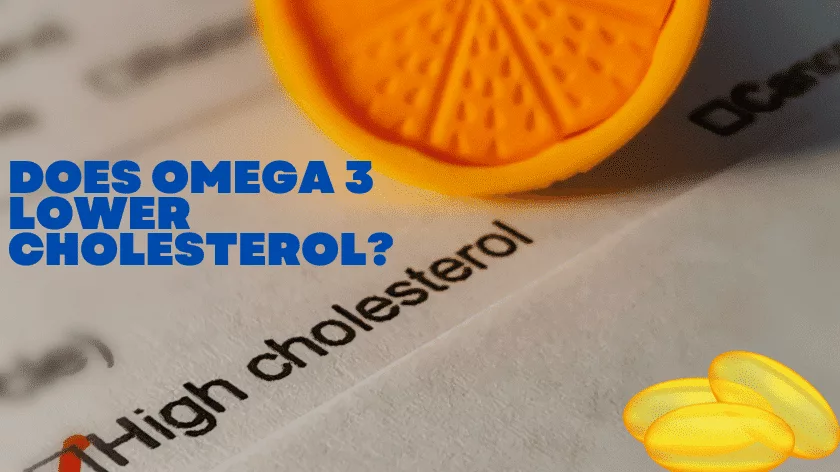High cholesterol is one of the most common risk factors for heart disease. So it’s no wonder people are always looking for ways to lower their cholesterol levels. One method you may have heard about is taking omega-3 supplements. But does omega 3 lower cholesterol?
Research shows that omega-3 fatty acids can help lower triglyceride levels [1], a type of blood fat that can contribute to high cholesterol levels. But omega-3 doesn’t seem to have the same effect on LDL cholesterol, the “bad” kind of cholesterol that can build up in your arteries and lead to heart disease.
So does this mean you should start taking omega-3 supplements to lower your cholesterol? Not necessarily. While omega-3 may help lower triglyceride levels, it’s not clear that it does enough to reduce the risk of heart disease.
Read on to learn more about how omega 3 affects cholesterol levels and the potential benefits and risks of taking omega 3 to lower cholesterol.
What is Cholesterol?
Cholesterol is a waxy, fat-like substance occurring naturally in all body parts. Although it’s often associated with unhealthy lifestyles, cholesterol is an essential part of the body and plays a vital role in many processes, including digestion and the production of hormones [2].
The body needs some cholesterol to function properly. Still, too much cholesterol can lead to serious health problems, including heart disease – the number one cause of death in the United States [3].
Cholesterol is carried through the blood by proteins known as lipoproteins, of which there are two main types – low-density lipoprotein (LDL) and high-density lipoprotein (HDL).
LDL cholesterol is known as “bad” cholesterol because it can build up in the arteries and form plaque – a substance made up of fat, cholesterol, calcium, and other substances that can narrow or block the arteries.
HDL cholesterol is often referred to as “good” cholesterol because it helps remove LDL cholesterol from the arteries. If you can keep your LDL cholesterol levels low and your HDL cholesterol levels high, you’ll be able to lower your risk of developing heart disease.
What Are The Dangers Of High Cholesterol?
Developing fatty deposits in your arteries (atherosclerosis) is one of the main dangers of having high cholesterol. And if these deposits grow too large, they can block blood and oxygen flow to your heart, potentially leading to a heart attack.
Atherosclerosis occurs when LDL cholesterol builds up in the walls of your arteries, causing them to narrow. This narrowing prevents blood and oxygen from flowing properly to your organs and other parts of your body.
Over time, atherosclerosis can lead to serious health problems, including heart attack, stroke, and peripheral artery disease. It is also a risk factor for developing other conditions, such as:
- Type 2 diabetes
- Kidney disease
- Metabolic syndrome
If you have any of these conditions, your chances of developing heart disease are even higher. That’s why it’s essential to keep your cholesterol levels in check and take steps to lower them if they’re too high.
What Are Omega-3 Fatty Acids?
You’ve probably already heard about omega-3 and how good they are for you. After all, omega-3 fatty acids have gained a lot of attention in recent years for the wealth of potential health benefits they offer.
Improving brain health is one of the most well-known benefits of omega-3s. These fatty acids can help protect the brain from age-related decline and improve cognitive function and memory.
Omega-3s are also good for the heart thanks to their ability to lower blood pressure, reduce inflammation, and prevent arrhythmias. In fact, omega-3s are one of the most well-studied nutrients for heart health.
There are three main types of omega-3 fatty acids:
- ALA (alpha-linolenic acid)
- DHA (docosahexaenoic acid)
- EPA (eicosapentaenoic acid)
Of these three, DHA and EPA are the most well-known and researched. ALA needs to be converted into DHA or EPA in order for the body to reap the benefits of these essential fatty acids.
You can find omega-3 fatty acids in various foods, including fatty fish like salmon, mackerel, and tuna, as well as plant-based sources like flaxseed, chia seeds, and hemp seeds. You can also take omega-3 supplements for a more convenient option.
Should You Take Omega 3 To Lower Cholesterol?
High cholesterol can have serious consequences, so it’s important to do what you can to lower your cholesterol levels if they’re high. There are many ways to lower cholesterol, but are diet and lifestyle changes enough?
If you’re struggling to lower your cholesterol, you may have considered an omega-3 supplement. The problem is that little research suggests that Omega 3 is more effective than other cholesterol-lowering treatments such as statins.
The good news is that you needn’t avoid Omega 3 altogether. While it may not be the most effective cholesterol-lowering treatment, it does offer other health benefits, including:
So, if you’re looking for a way to improve your overall health, an Omega 3 supplement is a good option. Just be sure to talk to your doctor first to make sure it’s right for you.
Does Omega 3 Lower Cholesterol? – Final Thoughts
Omega-3s shouldn’t be your first port of call when it comes to lowering cholesterol. However, they offer a range of other health benefits that make them worth considering as part of a healthy diet and lifestyle.
Among other things, omega-3s can support brain health, keep your joints healthy, and help lower inflammation throughout the body. These are all important factors in maintaining good health and preventing disease.
Statins and other cholesterol-lowering treatments are a more effective way to lower cholesterol, but making omega-3s a part of your diet is an excellent way to improve your overall health – especially thanks to their ability to lower triglycerides.
The main thing is to speak with your doctor about cholesterol levels and the best way to lower them. This will help you create the right plan for you and your individual health needs.





Leave a Reply